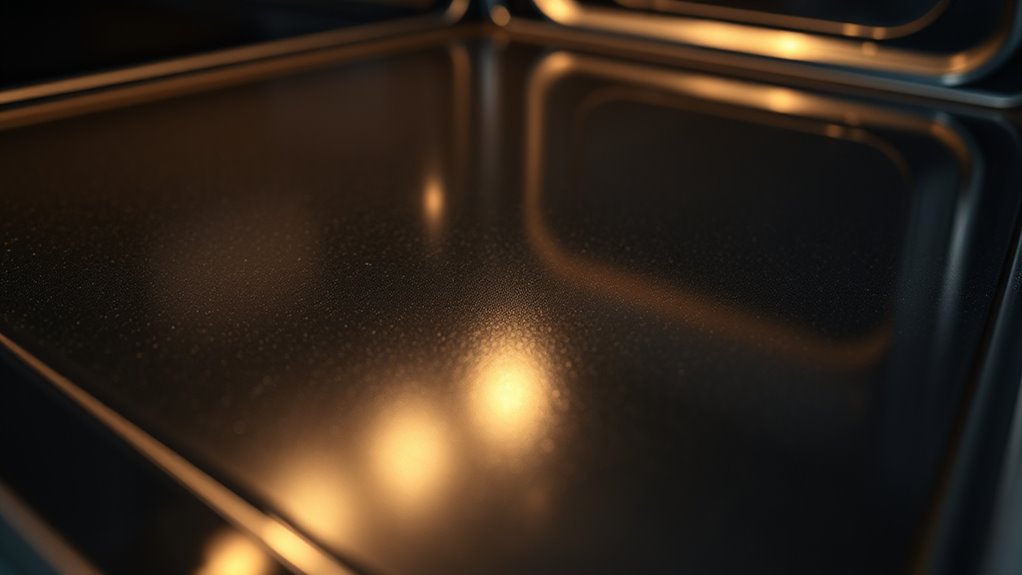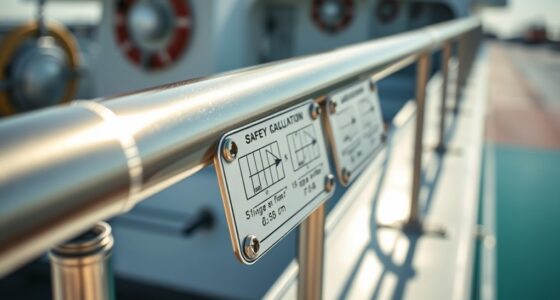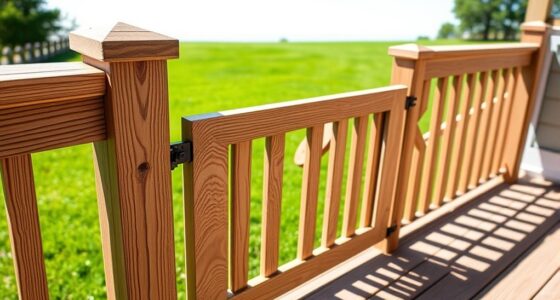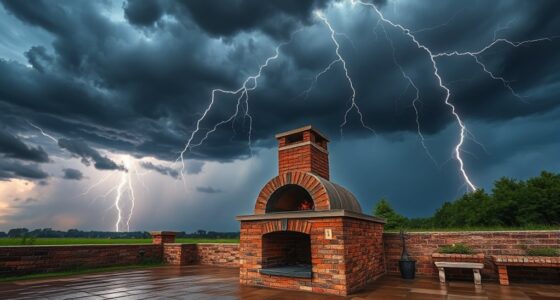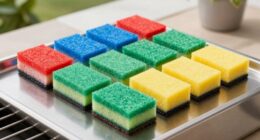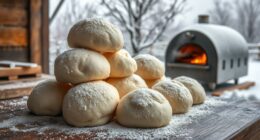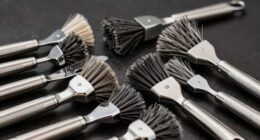When choosing a heat-resistant base for your oven, prioritize materials like ceramic fiber, mineral wool, or fiberglass that offer excellent thermal insulation and durability. These materials help keep surfaces cool, improve energy efficiency, and protect the appliance from heat damage. A good base will also support your oven’s performance and safety. To guarantee you make the best choice, explore how combining ceramic coatings and insulation options can enhance your oven’s longevity and safety features.
Key Takeaways
- Select materials like mineral wool, fiberglass, or ceramic fiber for effective thermal insulation and heat containment.
- Ensure the surface coating is ceramic-based for durability, crack resistance, and heat reflection.
- Prioritize bases that combine thermal insulation with heat-resistant coatings to enhance safety and longevity.
- Consider the oven’s operating temperature to choose materials that can withstand high heat without degradation.
- Opt for surfaces that are easy to clean, stain-resistant, and maintain their protective properties over time.

Heat-resistant surfaces are essential in environments exposed to high temperatures, ensuring safety and durability. When it comes to choosing the right base for your oven, understanding the importance of materials like ceramic coatings and thermal insulation is crucial. These components work together to protect both the oven and the surrounding area, preventing heat damage and maintaining optimal performance.
Ceramic coatings are a popular choice for heat-resistant surfaces because they offer excellent thermal stability. They form a protective layer that resists cracking, chipping, and corrosion, even under extreme heat. By applying ceramic coatings to your oven’s interior or exterior surfaces, you create a barrier that reflects and dissipates heat effectively. This not only enhances safety by reducing the risk of accidental burns but also prolongs the lifespan of your appliance. Ceramic coatings are also easy to clean, resistant to stains, and maintain their integrity over time, making them a reliable option for high-temperature environments.
Ceramic coatings provide thermal stability, resist cracking, and extend your oven’s lifespan with easy-to-clean, durable protection.
Thermal insulation plays a vital role in maintaining the efficiency of your oven. It traps heat within the cooking chamber, ensuring that energy is used effectively and that external surfaces stay cool enough to touch. Proper thermal insulation minimizes heat loss, which helps your oven reach and sustain high temperatures more quickly. This efficiency benefits both your energy bills and cooking performance. When selecting a base for your oven, look for materials that provide excellent thermal insulation—such as mineral wool, fiberglass, or high-quality ceramic fiber. These materials absorb and contain heat, preventing it from transferring to other parts of the appliance or the surrounding environment.
Combining ceramic coatings with thermal insulation creates a heat-resistant surface that is both durable and efficient. The ceramic layer protects the structural integrity of your oven, while the insulation ensures that heat stays where it should be—inside the cooking chamber. This synergy results in a safer, more energy-efficient appliance that can withstand prolonged exposure to high temperatures without degrading or losing performance.
Frequently Asked Questions
How Do I Clean Heat-Resistant Surfaces Properly?
To clean heat-resistant surfaces properly, start with gentle cleaning techniques like wiping with a soft cloth and mild soap. Avoid abrasive cleaners that could damage the material. Always check material compatibility before using any cleaning products. For stubborn stains, use a non-abrasive scrubber and test a small area first. Regular cleaning helps maintain the surface’s durability and guarantees it stays heat-resistant over time.
Are All Heat-Resistant Surfaces Equally Durable?
Not all heat-resistant surfaces are equally durable; in fact, durability testing shows some materials withstand temperatures up to 2000°F, while others only handle 1500°F. Surface material comparisons reveal that stainless steel outperforms ceramic and tempered glass in long-term heat exposure. You should consider these differences because choosing the right base depends on how much wear and heat your oven will endure, ensuring safety and longevity.
Can I Cut Directly on Heat-Resistant Surfaces?
You shouldn’t cut directly on heat-resistant surfaces because it compromises cutting safety and can damage the surface. Surface material differences matter; some materials like glass or ceramic may chip or crack, while others like cutting boards are designed for safety and durability. Always use a proper cutting surface to protect both your tools and your heat-resistant surfaces, ensuring safety and longevity.
Do Heat-Resistant Surfaces Affect Cooking Times?
Did you know that using heat-resistant surfaces can improve your cooking efficiency by maintaining consistent surface temperatures? These surfaces don’t directly affect your cooking times, but they help stabilize heat, ensuring even cooking. By preventing hot spots and heat loss, they optimize surface temperature control. So, while they don’t speed up or slow down cooking, they make your oven’s performance more reliable and efficient overall.
Are There Specific Brands Recommended for Heat-Resistant Surfaces?
You should look for trusted brand recommendations like Pyroceram or Vitroceramic, known for quality heat-resistant surfaces. When comparing materials, consider their durability and heat tolerance; glass-ceramics often outperform traditional ceramics. These brands offer reliable options that withstand high oven temperatures, ensuring safety and longevity. Always check product specifications and reviews to find the best fit for your oven and cooking needs.
Conclusion
When selecting a heat-resistant surface for your oven, remember to consider durability, safety, and ease of cleaning. Whether you opt for modern materials or a classic tile, make sure it can withstand the fiery trials of your baking adventures. Keep in mind, a good base is like a trusty steed—ready to serve you through many a feast. So choose wisely, and your culinary quests will always be a triumph, just like in the days of yore.
